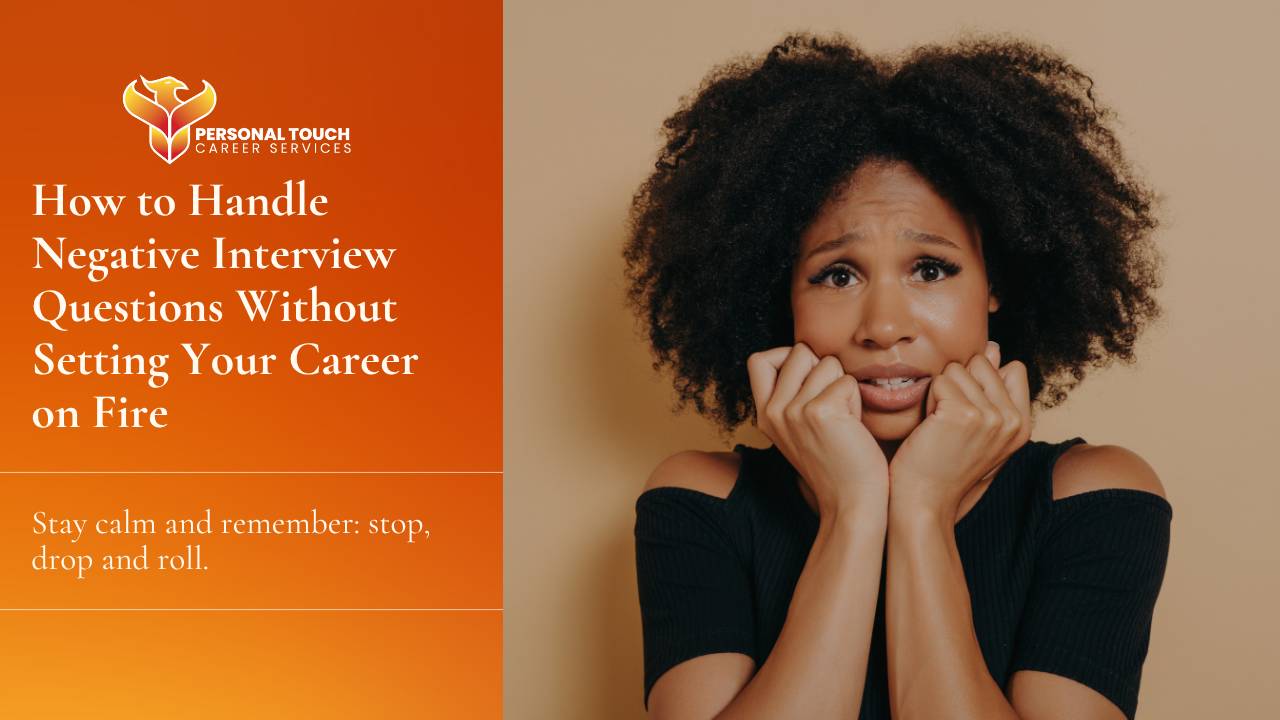How to Handle Negative Interview Questions Without Setting Your Career on Fire
Oct 03, 2025
By Dia Kline
Some childhood survival lessons are unforgettable. They stick with us because they scare us, and fear is an excellent teacher. Our parents and teachers weren't just trying to keep us safe on the playground. They were preparing us for a lifetime of complex situations that would require a basic sense of self-preservation.
Those firefighters who visited our schools knew what they were doing. They were teaching us crisis management disguised as fire safety.
A negative interview question is like someone spraying you with fire. Your interviewer just lit you up when they asked, "What is your biggest weakness?" or "Tell me about a time you had a conflict at work?" Now what? You channel your inner firefighter and put out the flame.
The Stop, Drop, and Roll Method for Interview Success
Just like fire safety, handling negative questions requires a specific protocol. When someone lights you up with negativity, you need to stop the negativity, drop the lesson, and roll away from the damage. Don't stay in a burning building, GET OUT!
Stop the Negativity
The moment you hear that negative question, resist the urge to fan the flames. It's incredibly easy to stay stuck in negativity and dwell on everything that went wrong: what you did wrong, what was done wrong to you, and how unfair the situation was.
Listening to negativity is exhausting. Nothing ever comes from it, and everyone wants you to just stop talking. Your interviewer doesn't want to hear a monologue about how your struggles made you stronger. They want to hear how you deal with challenges. Did you learn? Did you grow? Will you do it again?
Drop the Lesson
Here's where the magic happens and where most people fail. Don't offer excuses. Simply state what you learned, succinctly, and then… stop talking.
This is harder than it sounds. It's easier to spiral into all the reasons why something went wrong than to distill the experience into actionable wisdom. But that's precisely what separates the professionals from the amateurs.
Roll Away
Once you've dropped that lesson, you need to roll away from the fire, fast. Stop talking. Embrace the silence. It doesn't matter if that silence is awkward, uncomfortable, or vulnerable.
Silence is power.
One of the hardest things to master in life, and certainly in interviews, is knowing when to stop talking. We feel compelled to fill every pause, overexplain, and justify. But sometimes the most powerful thing you can do is deliver your lesson and let it land.
The Anatomy of a Perfect Response
When you're workshopping your responses to negative questions, follow this blueprint:
- Take Responsibility: Own up to what you did or didn't do. No finger-pointing allowed. You're not writing a novel about how unfair life is.
- State the Lesson: What did you learn? Be specific. "I learned to communicate better" is about as useful as career advice from the kids in The Breakfast Club. Try "I learned to send weekly progress updates to prevent miscommunication about project timelines." See the difference? Specificity matters.
- Describe Future Action: How will your behavior be different? This isn't about making promises you can't keep, it's about showing you've internalized the lesson and have a plan.
- Stop Talking: This cannot be overstated. Once you've delivered your response, zip it. Don't keep explaining like you're trying to convince them you're not the villain in your own story.
What This Looks Like in Action
👎🏼 Bad Response: I missed that deadline because my manager kept changing the requirements. The whole project was a mess from the beginning. How was I supposed to know what they wanted when they kept changing everything? I'm usually very reliable, but this situation was just impossible.
👍🏼 Good Response: I missed a critical deadline because I didn't include buffer time for potential revisions. I learned to always include a 20% time cushion to cover unexpected changes. Since then, I've never missed another deadline.
Notice the difference? One is a dumpster fire, and the other is a controlled demolition followed by a clean exit.
Key Takeaways
- Negative questions are fires that need to be extinguished, not fed
- Stop the negativity, don't dwell on the damage
- Drop the lesson, state what you learned clearly and concisely
- Roll away, embrace the power of silence
- Take responsibility without excuses
- Focus on future actions, not past grievances
- Practice your responses until stopping feels natural
The Power of Professional Fire Safety
Remember, your interviewer isn't trying to watch you burn, they're testing your ability to handle heat. They want to see that you can learn from mistakes, take responsibility, and move forward. They're not looking for perfection; they're looking for resilience and growth.
Every great comeback story starts with someone who knew when to stop the negativity, drop the wisdom, and roll toward something better. Don't be the person who stays in the burning building, complaining about the smoke.
Ready to master the art of putting out interview fires before they spread? Book your interview coaching session today and practice your ‘stop, drop, and roll’ technique until it becomes second nature! Schedule your free 30-minute resume review session with Dia Kline or Donna Shannon to see how we can help!
Wondering how effective your job search is? Schedule a complimentary 30-minute consultation with one of our career coaches, Donna Shannon or Dia Kline


